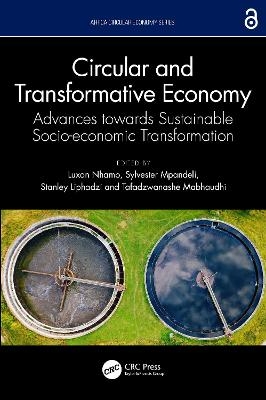
Circular and Transformative Economy
CRC Press (Verlag)
978-1-032-35601-3 (ISBN)
The main aim of this book is to illustrate circular models for sustainable resource management. It highlights the benefits of transformative approaches in integrating, simplifying, and facilitating understanding of complex systems and transforming systems towards greater sustainability while achieving multiple social, economic, and environmental outcomes. It provides pathways towards strategic policy decisions on socio-economic transformation supported by case studies.
Features:
Discusses exploration of a transitional path to the circular economy, explored from the point of view of waste and technology.
Explains transformational change towards sustainable socio-ecological interactions.
Reviews provision of pathways towards sustainability through scenario development.
Provides assessment of progress towards Sustainable Development Goals.
Presents cross-sectoral and multicentric approaches towards circularity.
This book is aimed at researchers and professionals in water and environmental engineering, circular economy, sustainability, and environmental studies.
The Open Access version of this book, available at www.taylorfrancis.com, has been made available under a Creative Commons [Attribution-Non-Commercial (CC-BY-NC)] 4.0 license.
Luxon Nhamo is a Research Manager at the Water Research Commission of South Africa (WRC) and an Honorary Research Fellow at the University of KwaZulu-Natal (UKZN), South Africa. He has over 20 years of progressive research experience in agricultural water management, environmental Geographic Information Systems and remote sensing, water-energy-food nexus, climate change adaptation, and early warning systems. Sylvester Mpandeli is an Executive Manager at the Water Research Commission of South Africa and an Adjunct Professor at the University of Venda. He is Vice President of the International Commission on Irrigation and Drainage (ICID) and the South African National Committee on Irrigation and Drainage (SANCID) Chairman. He is a member of the Gauteng Province Premier’s Advisory Team and a South African Weather Services board member. Stanley Liphadzi is a Group Executive Manager at the Water Research Commission (WRC) and an Adjunct Professor at the University of Venda. He leads the Research & Development Branch in the WRC in the production of new knowledge and innovation in water and sanitation. Stanley’s research interest is in systems thinking for sustainable development. Tafadzwanashe Mabhaudhi is a Senior Researcher and Research Group Leader: Sustainable and Resilient Food Systems at the International Water Management Institute (IWMI) and a Research Associate Professor at the University of KwaZulu-Natal (UKZN) and an Honorary Professor at the University of Nottingham, Malaysia. He has more than ten years of research experience, translating it into policy outcomes. He has published more than 185 papers and received several awards.
1. Understanding circularity and transformative approaches and their role in achieving sustainability. 2. Voluntary Agreements and Systemic Lock-in in the Circular Economy: The Certification of Sewage Sludge in Sweden. 3. Global Status of Circular Economy Adaptation within Wastewater Services: Transition Pathways and the Role of Innovation. 4. Transitional pathways towards sustainable food systems. 5. Strengthening the transformational implementation of national climate change adaptation plans to enhance agricultural resilience. 6. Progress towards the circular economy: Case studies of sanitation and organic waste-derived resource recovery technologies in South Africa. 7. The circular economy as a catalyst for environmental and human health. 8. Gender Norms and Social Transformation of agriculture in Sub-Saharan Africa. 9. Sustainable water management: does gender matter? 10. Enhancing socio-ecological interactions to achieve sustainable decentralised sanitation systems: why people are not using technical solutions. 11. A WEF nexus-based planning framework to assess progress towards Sustainable Development Goals. 12. Understanding the Nexus Between Water, Energy and Food in the Context of Climate Change Adaptation: A River Basin Perspective. 13. Catalysing cleaner production systems: Benchmarking with the COVID-19 lockdowns in South Africa. 14. Enhancing the resilience and adaptation of the education sector through intention awareness. 15. Summary: Creating systems innovation platforms for transformative pathways in circular economy.
| Erscheinungsdatum | 13.02.2024 |
|---|---|
| Reihe/Serie | Africa Circular Economy Series |
| Zusatzinfo | 14 Tables, black and white; 27 Line drawings, black and white; 18 Halftones, black and white; 45 Illustrations, black and white |
| Verlagsort | London |
| Sprache | englisch |
| Maße | 156 x 234 mm |
| Gewicht | 716 g |
| Themenwelt | Naturwissenschaften ► Biologie ► Botanik |
| Naturwissenschaften ► Biologie ► Ökologie / Naturschutz | |
| Wirtschaft ► Betriebswirtschaft / Management ► Unternehmensführung / Management | |
| Wirtschaft ► Volkswirtschaftslehre | |
| Weitere Fachgebiete ► Land- / Forstwirtschaft / Fischerei | |
| ISBN-10 | 1-032-35601-4 / 1032356014 |
| ISBN-13 | 978-1-032-35601-3 / 9781032356013 |
| Zustand | Neuware |
| Informationen gemäß Produktsicherheitsverordnung (GPSR) | |
| Haben Sie eine Frage zum Produkt? |
aus dem Bereich


